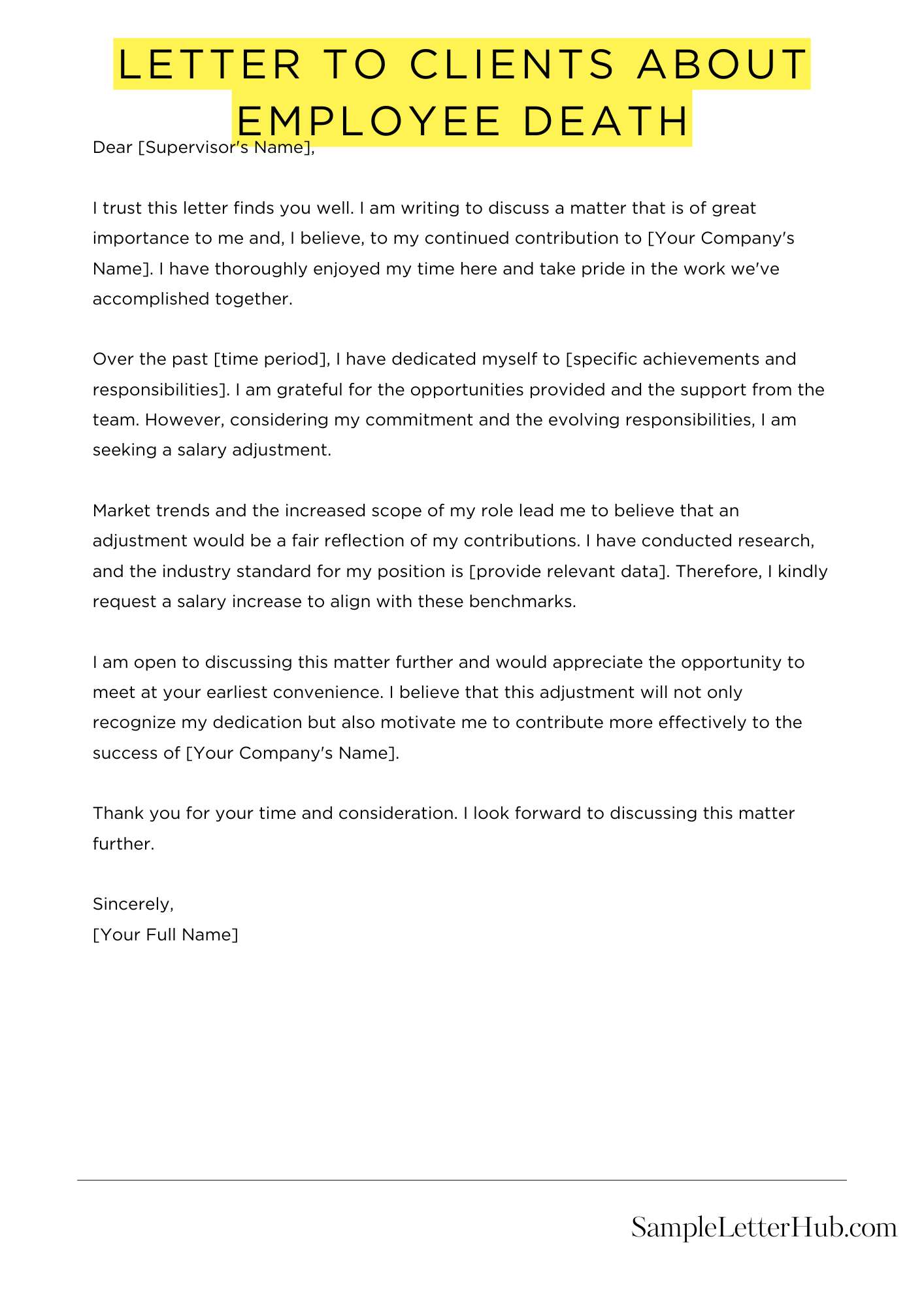Losing an employee is a difficult and sensitive matter for any organization. Writing a letter to clients about an employee’s death is an important task that requires compassion and professionalism. This type of letter serves to inform clients of the employee’s passing and to assure them that the organization will continue to serve them effectively.
In this article, we will provide templates and examples of letters to clients about an employee’s death. These samples will help guide you in crafting a thoughtful and appropriate message to communicate this unfortunate news to your clients. We understand the difficulty of this task, and our goal is to make it easier for you to navigate this challenging situation with grace and empathy.
Whether you need to notify clients of the passing of a team member or craft a general announcement about the loss, our letter samples will provide you with the words and tone to express your condolences and maintain strong relationships with your clients during this difficult time.
Letter to Clients About Employee Death
Dear Valued Clients,
It is with heavy hearts that we write to inform you of the passing of one of our beloved employees, [Employee Name]. We are deeply saddened to share this news with you, as [Employee Name] was a valued member of our team and made significant contributions to our company.
[Employee Name] was a dedicated and hardworking individual who had a positive impact on our organization and the clients they served. Their presence will be greatly missed, and it is a loss felt by all of us here at [Company Name].
During this difficult time, we want to assure you that we are taking necessary steps to ensure minimal disruption to our services. We have a plan in place to reallocate responsibilities and provide support to our team as they cope with this loss.
We understand that [Employee Name] had developed strong relationships with many of our clients, and we want to express our deepest condolences to those who may be affected by this loss. We are committed to maintaining the high level of service and professionalism that you have come to expect from us.
If you have any concerns or questions during this transition period, please do not hesitate to reach out to us. We value our partnership with you and want to ensure that we continue to meet your needs in the best way possible.
We thank you for your understanding and support during this difficult time. [Employee Name] will always be remembered for their hard work, dedication, and the positive impact they made on our company and our clients.
Sincerely,
[Your Name]

How to Write Letter To Clients About Employee Death
Introduction: Addressing the Unthinkable
Losing an employee is a tragic event for any organization. When the employee’s death occurs, it is important for the company to communicate this news to its clients in a respectful and professional manner.
Expressing Condolences and Empathy
In the opening of the letter, express sincere condolences for the loss of the employee. Use empathetic language to acknowledge the impact of the loss on the clients and the organization as a whole.
Highlighting the Employee’s Contributions
Take a moment to reflect on the employee’s contributions to the company and the positive impact they had on the clients. This serves as a reminder of the employee’s legacy and the valuable work they did.
Assuring Continuity of Service
In the letter, reassure the clients that despite the loss, the company remains committed to providing uninterrupted service. Emphasize any contingency plans put in place to ensure continuity and address any potential concerns the clients may have.
Offering Support and Resources
Provide information about any support resources available to the clients during this difficult time. This may include contact information for a designated point of contact within the company or resources for grief counseling.
Requesting Understanding and Patience
Ask for the clients’ understanding and patience during the transition period. Acknowledge that the company is navigating a challenging time and may experience temporary disruptions.
Closing with Gratitude
Close the letter with a message of gratitude for the clients’ understanding and continued partnership. Express appreciation for their support during this difficult time, and reiterate the company’s commitment to serving them with the same dedication and professionalism.
FAQs about Letter To Clients About Employee Death
As a market research expert, I have gathered the most frequently asked questions on the topic “Letter To Clients About Employee Death” to provide you with informative answers.
1. What is the purpose of writing a letter to clients about an employee’s death?
The purpose of writing a letter to clients about an employee’s death is to inform them of the tragic event and express condolences. It also aims to reassure clients of any continuity in services and address any concerns they may have.
2. How should the letter be structured and what information should it include?
The letter should begin with a sincere expression of sympathy, followed by factual information about the employee’s passing. It should include details about any impact on the client’s business, steps being taken to address the situation, and information about any temporary or permanent changes.
3. How can the letter be written in a sensitive and professional manner?
It is important to use a respectful tone and choose words carefully to convey empathy and professionalism. The letter should be clear, concise, and free from any unnecessary details or speculation.
4. Should the letter include information about the cause of the employee’s death?
It is generally recommended to avoid disclosing specific details about the cause of the employee’s death in the letter to clients. Instead, the focus should be on expressing sympathy, addressing any potential impact on the client’s business, and providing reassurance.
5. How can clients be supported after receiving the letter about an employee’s death?
After sending the letter, it is crucial to maintain open communication with clients, offer support, and address any concerns they may have. This may include providing updates on any necessary changes and demonstrating a commitment to maintaining the business relationship.

